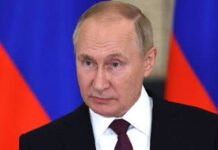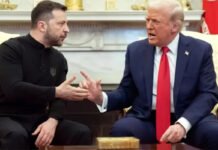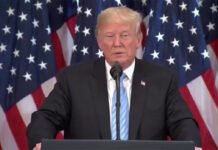In a stunning move that has reignited partisan tensions in Washington, Darren Beattie, a former Trump aide previously dismissed during the first term of President Donald Trump, has now assumed leadership of the United States Institute of Peace (USIP). The appointment of Beattie, a figure steeped in controversy due to his past associations and inflammatory remarks, has escalated an already volatile legal and political showdown over the institution’s future.
Who Is Darren Beattie? A Deep Dive into His Background
Darren Beattie, once a professor and policy advisor in the Trump White House, was ousted in 2018 after media revelations confirmed that he had appeared at a conference attended by white nationalists. His dismissal was swift, yet Beattie has since remained closely aligned with right-wing political circles.
He re-emerged in public discourse as the Under Secretary of Public Diplomacy at the U.S. State Department and gained notoriety for contributing to Revolver News, a fringe website that promoted conspiracy theories about the January 6 Capitol riot. Beattie’s commentary, often targeting minorities and women, has led to widespread criticism and raised red flags about his ideological inclinations.
Despite this, he has now been appointed Executive President of USIP, a development that critics argue contradicts the very mission of the peace-building organization.
Understanding the Role and Purpose of USIP
Founded by Congress in 1984, the U.S. Institute of Peace is a nonpartisan, independent organization dedicated to the promotion of global peace, the prevention of violent conflict, and the advancement of peacebuilding efforts worldwide. Operating with public funding, it plays a key role in conflict resolution, policy development, and training diplomats and civil society leaders in fragile states.
The organization has been previously lauded for its interventions in Iraq, Afghanistan, South Sudan, and Myanmar, offering strategic expertise to both American policymakers and international peace efforts.
Trump’s Longstanding Hostility Toward USIP
President Trump’s disdain for USIP has been well-documented. In February, he issued an executive order proposing the dismantling of four independent agencies, including USIP. This restructuring plan involved the creation of a Department of Government Efficiency (DOGE), helmed by billionaire entrepreneur Elon Musk.
Under the new order, DOGE was empowered to take over federal agencies’ assets, including USIP’s headquarters in Washington, D.C. As part of this offensive, hundreds of USIP employees were terminated, and the organization’s leadership was unilaterally replaced.
Judicial Showdown: Court Battle Over USIP’s Future
The sweeping order sparked an immediate legal challenge. USIP turned to the judiciary, and District Court Judge Beryl A. Howell ruled in favor of the institution. Her landmark decision declared the removal of the board and leadership illegal, citing the president’s lack of authority to unilaterally dismantle the agency without Congressional approval.
The ruling allowed USIP to regain control of its headquarters, and a portion of the staff was reinstated. However, the relief was short-lived.
In May, the U.S. Court of Appeals issued a stay on Judge Howell’s decision. The stay forced the organization to relinquish its premises once again and led to the retermination of reinstated employees. A three-judge panel later rejected USIP’s petition for a full court hearing, further complicating the matter.
Beattie’s Appointment Deepens the Political Divide
Beattie’s installment as USIP President amid this legal chaos has poured fuel on an already raging fire. His contentious background has ignited fierce opposition from bipartisan stakeholders, peace scholars, and foreign policy experts.
George Foot, the former Legal Advisor to USIP, publicly denounced the appointment, labeling it unlawful and ideologically incompatible with the organization’s ethos. Foot argued that Beattie’s new role stands in direct violation of the court’s original injunction and undermines both institutional integrity and America’s diplomatic standing.
“This appointment runs counter to the ideals of peace, diplomacy, and global cooperation. It is a betrayal of America’s promise to lead with principle,” Foot stated.
Domestic and International Backlash Escalates
Global peace partners and international NGOs have raised serious concerns about the credibility and impartiality of USIP under Beattie’s leadership. Several organizations have halted collaboration with the institute, citing ethical misalignment and fears of political weaponization.
Domestically, civil society groups, academic institutions, and former USIP employees have condemned what they view as an attempt to politicize an independent peace body. Protest letters have been dispatched to Congressional leaders demanding intervention and restoration of the board’s autonomy.
A coalition of bipartisan senators is reportedly working to introduce emergency legislation to shield independent institutions like USIP from future executive overreach, which may set the stage for a new constitutional confrontation in the coming weeks.
The Broader Implications for U.S. Diplomacy and Global Peace
The controversy has wide-reaching implications. The weakening of USIP’s operational independence could significantly hamper America’s soft power capabilities and credibility in conflict zones. Diplomatic experts warn that dismantling or politicizing such an institution will diminish the United States’ ability to mediate, train peacekeepers, and support nonviolent transitions in war-torn regions.
Former diplomats have also warned that the damage to USIP’s structure and morale could take years to repair, even if judicial relief is ultimately granted.
What’s Next: The Legal Clock Ticks
As of now, the appeals court decision remains in effect, and the case is expected to return to a federal courtroom in the fall. Legal experts anticipate a constitutional showdown on the limits of executive power and the future of federally chartered independent organizations.
Meanwhile, Beattie has signaled his intention to “redefine peace through strength”, a phrase that critics interpret as a militarized and nationalistic deviation from traditional peace-building norms. His public statements suggest an agenda focused on institutional realignment, prompting fears that USIP may be transformed from a neutral peace broker into an ideological apparatus serving far-right objectives.
Conclusion: USIP’s Mission at a Crossroads
The appointment of Darren Beattie as President of USIP, amid ongoing judicial battles and political infighting, underscores the fragile state of nonpartisan governance in American public institutions. What was once a respected pillar of global peacebuilding now stands at the heart of a high-stakes constitutional crisis.
As the legal saga continues to unfold, the world watches closely. The outcome of this conflict will not only decide the future of USIP, but may also determine whether U.S. foreign policy will remain anchored in democratic values—or become an instrument of partisan transformation.
















